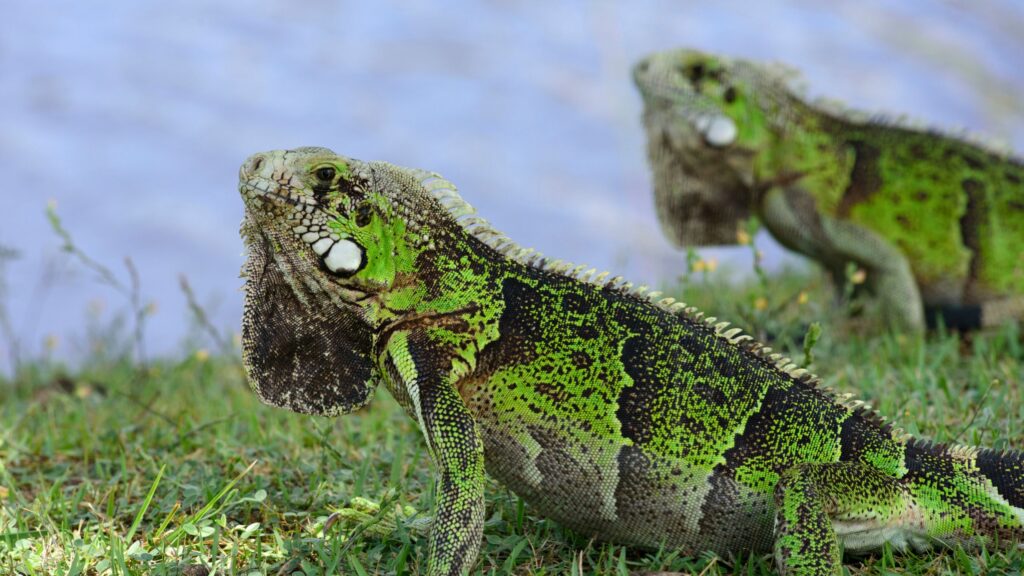Introduction
Iguanas are known for their resilience in warm climates, but what happens when temperatures drop? In Florida, us Floridians understand the “cold” seasons where these moments happen. In here, we will explore the phenomenon of the frozen iguana, examining whether these reptiles pose any danger when they freeze and how to handle such situations. By understanding iguana behavior in cold weather, we can better manage encounters with these reptiles during unexpected cold snaps.
Are Iguanas Cold Blooded?
The answer to the question of, are iguanas cold blooded is yes, iguanas are ectothermic, meaning their body temperature is regulated by external environmental conditions. When temperatures drop, their metabolism slows down, and they become less active. This is why iguanas are commonly seen basking in the sun to absorb heat and maintain their body temperature.
The phenomenon of frozen iguanas in Florida occurs when temperatures drop below a certain threshold, causing these cold-blooded reptiles to become immobile and appear lifeless. This is a survival mechanism that helps them conserve energy during cold snaps.
Do Iguanas Freeze and Come Back to Life?
Do iguanas freeze and come back to life? While it may seem like iguanas are dead when they freeze, many of them can recover once temperatures rise. When an iguana’s body temperature drops significantly, it enters a state of torpor, where its bodily functions slow down drastically. This state allows iguanas to survive short periods of cold weather.
However, not all iguanas survive freezing temperatures. Prolonged exposure to cold can be fatal. The sight of an iguana frozen and falling from trees is a common occurrence in Florida during unexpected cold snaps.
How to Handle Frozen Iguanas
If you encounter a frozen iguana, it’s important to know how to handle the situation safely:
- Do Not Touch: Avoid touching or moving a frozen iguana, as they may still be alive and can become aggressive when they warm up.
- Keep Pets and Children Away: Ensure that pets and children are kept away from frozen iguanas to prevent any potential harm.
- Contact Professionals: If you find multiple frozen iguanas or if they pose a threat, contact professional wildlife control services from Iguana Busters for assistance. Our team can safely and humanely handle these situations, ensuring the safety of both the iguanas and your property.
In January 2020, Florida residents were warned of falling iguanas as temperatures dropped, highlighting the unusual yet real impact of cold weather on these reptiles. This phenomenon, often referred to as the frozen iguana warning, serves as a reminder of the challenges iguanas face during cold weather.
Frequently Asked Questions
Yes, iguanas are cold-blooded reptiles that rely on external heat sources to regulate their body temperature.
Iguanas can enter a state of torpor when temperatures drop, appearing frozen but often reviving once it warms up.
This special time occurs during unexpected cold snaps, causing iguanas to become immobile and fall from trees.
Residents are often warned of falling iguanas during cold weather, as the reptiles can pose a hazard.
When iguanas freeze, they enter a state of torpor, but not all survive prolonged cold exposure.
Conclusion
The phenomenon of the frozen iguana is a unique challenge for both the reptiles and the residents of Florida. Understanding how iguanas react to cold weather and how to handle frozen iguanas safely is crucial. At Iguana Busters, we offer expert advice and services to manage iguana-related issues, ensuring the safety of both people and animals.
If you encounter frozen iguanas or need assistance with iguana control, contact Iguana Busters today. We provide humane and effective solutions to keep your property safe from these reptiles. For more information on iguana behavior and how to handle them during cold weather, refer to local wildlife resources and expert advice.
In conclusion, while frozen iguanas can be startling, understanding their behavior and knowing how to respond can mitigate potential risks. By staying informed and seeking professional help when needed, you can ensure the safety of your property and the well-being of these unique reptiles.


